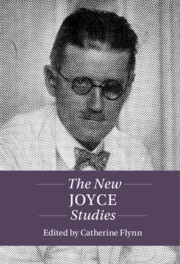Book contents
- The New Joyce Studies
- Twenty-First-Century Critical Revisions
- The New Joyce Studies
- Copyright page
- Contents
- Figures
- Notes on Contributors
- Acknowledgments
- Abbreviations
- Introduction
- Part I Scope
- Chapter 1 The Transcripts of (Post)Colonial Modernity in Ulysses and Accra
- Chapter 2 Joyce and Race in the Twenty-First Century
- Chapter 3 Dubliners and French Naturalism
- Chapter 4 Joyce and Latin American Literature Minor Transnationalism and Modernist Form
- Chapter 5 The Multiplications of Translation
- Chapter 6 The Joycean Public Domain and the Shape of Freedom
- Chapter 7 Ulysses in the World
- Part II Fragment and Frame
- Part III Perspective
- Bibliography
- Index
Chapter 2 - Joyce and Race in the Twenty-First Century
from Part I - Scope
Published online by Cambridge University Press: 01 September 2022
- The New Joyce Studies
- Twenty-First-Century Critical Revisions
- The New Joyce Studies
- Copyright page
- Contents
- Figures
- Notes on Contributors
- Acknowledgments
- Abbreviations
- Introduction
- Part I Scope
- Chapter 1 The Transcripts of (Post)Colonial Modernity in Ulysses and Accra
- Chapter 2 Joyce and Race in the Twenty-First Century
- Chapter 3 Dubliners and French Naturalism
- Chapter 4 Joyce and Latin American Literature Minor Transnationalism and Modernist Form
- Chapter 5 The Multiplications of Translation
- Chapter 6 The Joycean Public Domain and the Shape of Freedom
- Chapter 7 Ulysses in the World
- Part II Fragment and Frame
- Part III Perspective
- Bibliography
- Index
Summary
Sen’s chapter examines specific historical manifestations of race, particularly the representations of black and brown bodies in Joyce’s texts, annotating Joyce’s concerns with twentieth-century colonialism while also acknowledging the enduring forms of imperialism and hegemony in the contemporary moment: the multiethnic contemporary present of Irish life and the concurrent reinvigoration of white supremacist and racist nationalisms in twenty-first-century geopolitics.Sen’s chapter asks how Joyce’s texts inform our understanding of the present and its multiple sociopolitical and ecological challenges within which race operates as a key determinant. He examines a scene in “The Dead” as staging the delegitimization of the subject of blackness, appearing as it does as an impolite intrusion upon civil discourse. He interprets the reading in “Cyclops” of the account of the lynching as normalizing violence against bodies of color. Sen asks when Joycean ironies fail to humanize and modernize subjects of color within empire.
- Type
- Chapter
- Information
- The New Joyce Studies , pp. 35 - 49Publisher: Cambridge University PressPrint publication year: 2022

